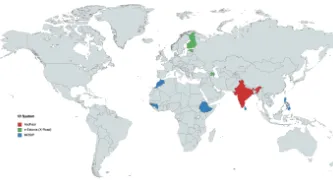Search
Content type: Case Study
This piece was written by Privacy International, based on publicly available information and on research by our partners at Hiperderecho
Overview
The Documento Nacional de Identidad (DNI) is the personal ID card recognised by the Peruvian State in any situation where a person might have to identify themselves, be it in an administrative, judicial, civil, or commercial context. The DNI also grants its holder the right to vote.
The DNI issuing and overseeing body is the Registro Nacional de…
Content type: Advocacy
We, the undersigned civil society organizations and individuals, urge the World Bank and other international organizations to take immediate steps to cease activities that promote harmful models of digital identification systems (digital ID).
The signatories of this letter are located in different countries, work with diverse communities, and bring a wide range of expertise. Among this group, there are many shared concerns and similar experiences documenting the harmful impacts…
Content type: Advocacy
Read in English
Nosotros, las organizaciones de la sociedad civil y los individuos abajo firmantes, instamos al Banco Mundial y a otras organizaciones internacionales a que tomen medidas inmediatas para cesar las actividades que promueven modelos perjudiciales de sistemas de identificación digital (ID digital).
Los firmantes de esta carta se encuentran en diferentes países, trabajan con diversas comunidades y aportan una amplia gama de conocimientos. Entre este grupo, hay muchas…
Content type: News & Analysis
In a ruling handed down on 14 October 2021 by the High Court of Kenya in relation to an application filed by Katiba Institute calling for a halt to the rollout of the Huduma card in the absence of a data impact assessment, the Kenyan High Court found that the Data Protection Act applied retrospectively.
Background to the case
Huduma Namba as initially proposed
In January 2019, the Kenyan Statute Law (Miscellaneous Amendment) Act No. 18 of 2018 came into effect, introducing a raft of amendments…
Content type: Case Study
Overview
Estonia is widely considered one of the most digitally advanced countries in the world. Its e-ID is the gateway through which e-citizens are able to access most public services. Estonia's e-ID is both designed and operated by a collection of private companies, and overseen by the Police and Border Guard agency.
X-Road® (implemented in Estonia as X-tee) is the free and open-source data exchange layer which provides a standardised method for transferring information between the data…
Content type: Case Study
This written piece is part of PI's wider research into the tech behind ID systems around the world. Click here to learn more.
Overview
Aadhaar (Hindi for ‘foundation’) is India’s ID programme, the largest in the world, surpassing 1 billion sign ups in just under 6 years. This programme aims to give every citizen a unique, biometrically-verifiable identification number. Each user receives a card with their number on it, which can be cross-referenced with the biometric data held in a government…
Content type: Long Read
For over 20 years with the start of the first use of ICTs in the 1990s, we have seen a digital revolution in the health sector. The Covid-19 pandemic significantly accelerated the digitalisation of the health sector, and it illustrates how fast this uptake can be and what opportunities can emerge; but also, importantly, the risks that it involves.
As we've said many times before, whilst technologies can be part of the solution to tackle some socio-economic and political challenges facing our…
Content type: Long Read
Governments around the world are increasingly making registration in national digital ID systems mandatory for populations, justifying its need on a range of issues from facilitating access to services, to national security and fighting against corruption. This is an attempt to create a "foundational identity" for an individual, or "a single source of truth" about who someone is, according to a government agency. These identity systems are run by governments, sometimes by private companies, or…
Content type: Advocacy
Some of the most vulnerable groups in Mexico are amongst the groups at risk from a draft General Population Law that creates a biometric “Unique Digital Identity Card” (CUID), argue civil society organisations. The proposed law has now reached the senate, and has raised serious concerns from civil society organisations. Led by our global partner in Mexico Red en Defensa de los Derechos Digitales (R3D), PI along with 25 organisations have signed a joint letter to the members of the senate,…
Content type: News & Analysis
After almost 20 years of presence of the Allied Forces in Afghanistan, the United States and the Taliban signed an agreement in February 2020 on the withdrawal of international forces from Afghanistan by May 2021. A few weeks before the final US troops were due to leave Afghanistan, the Taliban had already taken control of various main cities. They took over the capital, Kabul, on 15 August 2021, and on the same day the President of Afghanistan left the country.As seen before with regime…
Content type: Advocacy
On 6 August 2021, the World Health Organisation (WHO) published its technical specifications and implementation guidance for “Digital Documentation of COVID-19 Certificates: Vaccination Status” (DDCC:VS) following months of consultations. As governments around the world are deploying their own Covid-19 certificates, guidance from the global health agency was expected to set a global approach, and one that prioritises public health. As such, we would expect the WHO to identify what these…
Content type: Examples
In January 2021, the Indian Health Ministry officially allowed Aadhaar-based authentication when creating a UHID for identification and authentication of beneficiaries for various health IT applications promoted by the Ministry. This enabled the Co-Win portal, which is used to book COVID-19 vaccination appointments, to accept Aadhaar for authentication. As per Clause 2a of Co-Win’s privacy policy, “If you choose to use Aadhaar for vaccination, you may also choose to get a Unique Health ID…
Content type: News & Analysis
Legislation to "strengthen the integrity of UK elections and protect our democracy" through the Elections Integrity Bill was introduced to parliament this week.
This legislation will require people, for the first time in Great Britain, to show a state-issued photo ID, such as a driving license or passport, in order to exercise their right to vote, perhaps by the 2023 General Elections. The changes would affect elections in England, Scotland and Wales while voters in Northern Ireland are already…
Content type: Long Read
Este informe está disponible en español.
Most national ID or identifying documents include a gender marker. This is often known as a 'sex marker,' even though the term is inaccurate. The presence of such markers, especially on birth certificates, contribute to our society’s emphasis on gender as a criterion for assigning identities, roles and responsibilities within society. With gender being such a determining and dominant identifier, it puts it at the centre of so many arrays of our…
Content type: Report
Many countries in the world have existing ID cards - of varying types and prevalence - there has been a new wave in recent years of state “digital identity” initiatives.
The systems that states put in place to identify citizens and non-citizens bring with them a great deal of risks.
This is particularly the case when they involve biometrics - the physical characteristics of a person, like fingerprints, iris scans, and facial photographs.
Activists and civil society organisations around the…
Content type: Report
A common theme of all major pieces of national jurisprudence analyzing the rights implications of national identity system is an analysis of the systems’ impacts on the right to privacy.
The use of any data by the State including the implementation of an ID system must be done against this backdrop with respect for all fundamental human rights. The collection of data to be used in the system and the storage of data can each independently implicate privacy rights and involve overlapping and…
Content type: Report
National identity systems naturally implicate data protection issues, given the high volume of data necessary for the systems’ functioning.
This wide range and high volume of data implicates raises the following issues:
consent as individuals should be aware and approve of their data’s collection, storage, and use if the system is to function lawfully. Despite this, identity systems often lack necessary safeguards requiring consent and the mandatory nature of systems ignores consent…
Content type: Long Read
Immunity Passports have become a much hyped tool to cope with this pandemic and the economic crisis. Essentially, with immunity passports those who are 'immune' to the virus would have some kind of certified document - whether physical or digital. This 'passport' would give them rights and privileges that other members of the community do not have.
This is yet another example of a crisis-response that depends on technology, as we saw with contact-tracing apps. And it is also yet another…
Content type: Explainer
Definition
An immunity passport (also known as a 'risk-free certificate' or 'immunity certificate') is a credential given to a person who is assumed to be immune from COVID-19 and so protected against re-infection. This 'passport' would give them rights and privileges that other members of the community do not have such as to work or travel.
For Covid-19 this requires a process through which people are reliably tested for immunity and there is a secure process of issuing a document or other…
Content type: Case Study
Having a right to a nationality isn’t predicated on giving up your right to privacy - and allowing whichever government runs that country to have as much information as they want. It is about having a fundamental right to government protection.
For the first time since 1951, Assam - a state in the north east of India - has been updating its national register of citizens (NRC), a list of everyone in Assam that the government considers to be an Indian citizen. The final version, published in…
Content type: Long Read
Background
Kenya’s National Integrated Identity Management Scheme (NIIMS) is a biometric database of the Kenyan population, that will eventually be used to give every person in the country a unique “Huduma Namba” for accessing services. This system has the aim of being the “single point of truth”, a biometric population register of every citizen and resident in the country, that then links to multiple databases across government and, potentially, the private sector.
NIIMS was introduced…
Content type: News & Analysis
Photo: The European Union
“Border Externalisation”, the transfer of border controls to foreign countries, has in the last few years become the main instrument through which the European Union seeks to stop migratory flows to Europe. Similar to the strategy being implemented under Trump’s administration, it relies on utilising modern technology, training, and equipping authorities in third countries to export the border far beyond its shores.
It is enabled by the adoption…
Content type: Long Read
Photo: Francesco Bellina
Driven by the need to never again allow organised mass murder of the type inflicted during the Second World War, the European Union has brought its citizens unprecedented levels of peace underpinned by fundamental rights and freedoms.
It plays an instrumental role in protecting people’s privacy around the world; its data protection regulation sets the bar globally, while its courts have been at the forefront of challenges to unlawful government surveillance…
Content type: News & Analysis
Photo by Sharon McCutcheon on Unsplash
In May, the United Nations Special Rapporteur on extreme poverty and human rights, Philip Alston invited all interested governments, civil society organisations, academics, international organisations, activists, corporations and others, to provide written input for his thematic report on the human rights impacts, especially on those living in poverty, of the introduction of digital technologies in the implementation of national social protection…
Content type: Examples
After an 18-month investigation involving interviews with 160 life insurance companies, in January 2019 New York Financial Services, the state's top financial regulator, announced it would allow life insurers to use data from social media and other non-traditional sources to set premium rates for its customers. Insurers will be required to demonstrate that their use of the information doesn't unfairly discriminate against specific customers. New York is the first state to issue specific…
Content type: Long Read
IMAGE SOURCE: "My Phone Bought This" by oliver t is licensed under CC BY-NC-ND 4.0.
LAST UPDATE: 16th May 2022.
Mandatory SIM card registration laws require people to provide personal information, including a valid ID or even their biometrics, as a condition for purchasing or activating a SIM card. Such a requirement allows the state to identify the owner of a SIM card and infer who is most likely making a call or sending a message at any given time.
SIM card…
Content type: Explainer
Photo credit: warrenski
Mandatory SIM card registration eradicates the potential for anonymity of communications, enables location-tracking, and simplifies communications surveillance and interception. By facilitating the creation of an extensive database of user information, it places individuals at risk of being tracked or targeted, and having their private information misused. In the absence of comprehensive data protection legislation and judicial oversight, SIM users' information can be…
Content type: Long Read
Photo credit: Francisco Javier Argel
Questions of identification and ID, with their associated privacy risks, are only increasing. There are multiple dimensions to understanding the impact of ID and identification; a key one is to understand how it can exclude. This is why Privacy International is conducting research to explore this important and underreported aspect.
Read our case studies: Carolina and Iliana.
In the identity discourse, identity is often closely linked to themes of “…
Content type: News & Analysis
Photo Credit: Marion S. Trikosko
This month, the World Bank's Identity for Development (ID4D) initiative is launching its inaugural "Mission Billion Challenge", a competition designed to promote innovation in the identity space with the inaugural question: "How can digital identification systems in developing countries be designed to protect people’s privacy and provide them with greater control over their personal data?” But make no mistake: introducing "privacy by design" does…
Content type: Long Read
Image attribution: By Legaleagle86 at en.wikipedia, CC BY-SA 3.0.
In a long-anticipated judgment, the Indian Supreme Court has ruled that India's controversial identification system Aadhaar is Constitutional. They based their conclusion on notes that there are sufficient measures in place to protect data, and that it is difficult to undertake surveillance of citizens on the basis of Aadhaar.
But there is some good in this ruling. The court has demanded that the Government introduce…

























